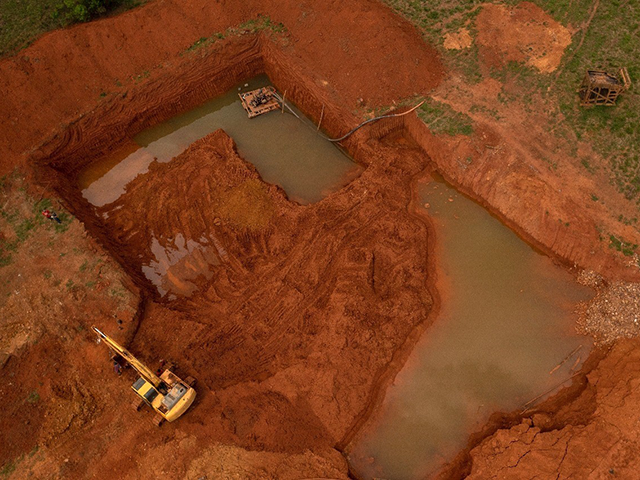A Brazilian investigative journalist group on Monday published documents that showed the “four most valuable companies in the world” — namely Apple, Microsoft, Google, and Amazon — purchased gold illegally mined in the Amazon region for use in their electronic products.
Repórter Brasil said the illegal gold “passed through the hands of middlemen” before finding its way into the manufacturing processes of the four tech giants as gold filaments used in smartphones and computers.
According to the report, one of the key suppliers of the contraband gold was an Italian refiner called Chimet, which is under investigation by Brazilian authorities for buying millions in gold from a trader called CHM do Brasil that allegedly obtained the metals from wildcat miners operating illegally in the protected Kayapo indigenous territory. Police reports Repórter Brasil claimed to have observed included satellite photos of mining pools and secret airfields littering the immense Kayapo reserve.
Another company allegedly involved in trading legally dubious gold is a prestigious Sao Paulo-based firm called Marsam Refinadora, which has been under scrutiny since late last year for obtaining gold from wildcat miners.
Repórter Brasil charged that in addition to trespassing on indigenous land – and occasionally getting into violent confrontations with the inhabitants – illegal miners are damaging the fabled Amazon Rainforest and releasing toxic substances like mercury into the water.
The authors noted that Apple, Google, Microsoft, and Amazon all have published standards for obtaining raw materials that should preclude them from using illegally obtained gold, and the U.S. Securities and Exchange Commission (SEC) is supposed to police the trade in “conflict ores,” a term popularized in the 2010s due to controversial mineral explorations in conflict zones like the Democratic Republic of Congo (DRC).
“One of the problems is that, despite the episodes of violence provoked by illegal mining in the Amazon, these organizations do not consider Brazil a ‘risk area,’” Repórter Brasil noted.
The report charged the four big tech companies, and the SEC, with not caring about “the real origin of the gold they use – or the conflicts they may be feeding in Brazilian territory.”
The authors castigated the Brazilian government, as well, for allegedly not doing enough to discourage illegal mining or trace the movement of metals from miners to traders.
Part of the controversy around Chimet supplier CHM is that it did not register with Brazil’s central bank as a gold supplier – a step the company argued was unnecessary because it purchases gold as an industrial “commodity,” rather than as a “financial instrument.”
The Brazilian central bank does not regulate gold when it is traded as a commodity. Critics of these policies say the commodity loophole is invalid and Brazilian law actually requires every entity that buys and sells gold to register with the bank.
“Illegal mining has surged in Brazil since right-wing President Jair Bolsonaro took office in 2019, advocating for wildcatters and seeking to legalize mining on indigenous land,” alleged Reuters, which also claimed access to the documents uncovered by Repórter Brasil.
Reuters quoted an estimate from Brazilian think tank Escolhas that illegal gold mining increased 23 percent during Bolsonaro’s first two years in office, making almost half of Brazil’s total gold output questionable.
“A company that is buying gold from Brazil already knows there is a huge risk it is buying irregular gold – Amazon blood gold,” charged Escolhas analyst Larissa Rodrigues.
Bolsonaro has long argued that too much of Brazil’s territory is off-limits to mining, making much of the nation’s mineral wealth inaccessible. The president, who is the son of a prospector, views prospecting as “elevated potential for the generation of wealth and income for a population of hundreds of thousands of people.”
In March, Bolsonaro proposed lifting the bans on mining in indigenous territories to secure vitally-needed supplies of fertilizer materials like potassium, which has been in short supply worldwide since Russia’s invasion of Ukraine.
“Our food security and agribusiness require executive and legislative measures so that we don’t depend externally on something we have in abundance,” the Brazilian president said.
Bolsonaro’s opponent in the October presidential race, left-wing former president Luiz Inacio Lula da Silva, promises to halt all mining, oil exploration, and commercial agriculture on indigenous lands. However, Lula was roundly criticized for not doing enough to control illegal mining when he held office from 2003 to 2010. His environment minister, Marina Silva, caused a stir by resigning in frustration in 2008.
“Although Lula has adopted the environmental talk, the practice is development at whatever cost,” Greenpeace Brazil campaign director Marcelo Furtado complained after Silva’s resignation. On the other hand, farm groups denounced her as a “radical” and “obstacle to economic development” due to the policies she was able to enforce.
Wildcat mining was hardly unknown during Lula’s administration. In 2007, there was an infamous gold rush to a “new Eldorado” when impoverished Brazilian workers stampeded to an illegal mine on the banks of the Juma river, with dreams of striking it rich. Even before the Juma rush, there were an estimated half-million wildcat miners at work under Lula.
Representatives from Chimet and Marsam denied wrongdoing and claimed they took appropriate measures to keep illegal gold from their supply chains.
Apple issued a general statement that it removes suppliers of illegally mined minerals from its supply chains, while Amazon, Microsoft, and Google’s parent company Alphabet had no immediate comment on the report. Reporter Brasil noted that all four companies have made public commitments to avoid using conflict ores or dealing with environmentally irresponsible mining projects.

COMMENTS
Please let us know if you're having issues with commenting.